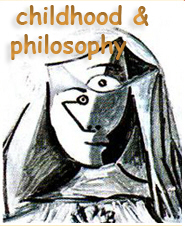the experience of childhood, and its significance in the philosophy for children project
Parole chiave:
Infancia, Experiencia, Filosofía para Niños, Educación, NatalidadAbstract
Our constitution of the meaning of childhood is stretched between the voracity with which the market demands consumers and skilled labor and our good intentions for a better future. To pose the question of childhood constitutes a necessary step towards understanding the place to which we assign children in our society, our culture and our educational practices. This paper is part of a wider investigation into the foundations, assumptions and strategies of the Philosophy for Children program, and into its connections with the pragmatism. I begin by posing the question of childhood as a basic presupposition of Matthew Lipman’s program--as any educational practice implicates a construction of meaning that supports it. Lipman's conception of childhood appears directly linked to education, because his problem is to justify a philosophy program at school from kindergarten to high school. The idea of childhood that he takes from Dewey highlights two key points. On the one hand the child carries a within her a promise of creativity, and the potential to become what we project onto her; everything depends on the action of the adult towards her. On the other hand, childhood poses a part-whole problem, since it is necessary to understand the whole civilization to understand the meaning of childhood, which is part of the whole; if we understand the whole, we understand the part. Childhood as the stage of life most conducive to the formation of habits and customs; childhood as a promise, a possibility; childhood as part of civilization; and childhood as characterized by natural dispositions to wondering and thinking: these are the points that enable the encounter between childhood and philosophy.Downloads
I dati di download non sono ancora disponibili.
Downloads
Pubblicato
2012-02-08
Fascicolo
Sezione
articles



